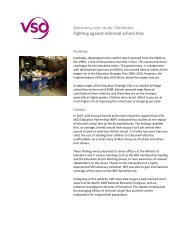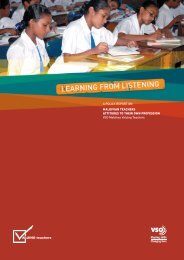Teachers' Voice â Nigeria - VSO
Teachers' Voice â Nigeria - VSO
Teachers' Voice â Nigeria - VSO
- No tags were found...
You also want an ePaper? Increase the reach of your titles
YUMPU automatically turns print PDFs into web optimized ePapers that Google loves.
Teachers identify some of the traits of good teachers as punctual, hard working, dressed welland committed.What they see as motivating factors are:• good and prompt pay• full attendance and punctuality of students, who grasp an understanding of lessons• regular promotions and allowances for extra efforts• regular opportunities for professional development and enhancement of skills and knowledge.Demotivating factors consist of:• poor and irregular pay with no allowances and no regular promotions• poor working conditions: insufficient teaching and learning materials and overcrowdedclassrooms• unsupportive community, students and government.Rural UrbanHighly motivated 11% 8%Slightly motivated 24% 47%Fairly demotivated 36% 23%Very demotivated 29% 22%The figures also expose the notion that teachers in urban areas are more motivated than thosein rural schools. Many teachers do not want to teach in rural areas due to remoteness; lack ofamenities; distance from homeland; and working conditions.Rural schools are even worse equipped than urban schools, have even less professionaldevelopment opportunities and are even more isolated from new policies and governmentinitiatives. The absence of any incentives to work in rural areas means many teachers are supplyposted to these areas, with little prior notice or financial aid. This deepens teachers’dissatisfaction even further.Teachers quote poor salaries as the number one demotivating factor. They express theirdissatisfaction with their poor standard of living; delays in salaries; dishonest deductions fromsalaries; poor implementation of promotions; and the lack of allowances, such as leave, health,transport etc.This mixture of factors, and the low, inadequate and insufficient wage that cannot sustain them,reflects and reinforces their belief that they are worthless, undervalued and unappreciated. Itleads to their taking other employment to the detriment of education in <strong>Nigeria</strong>.Inadequate TLMs is second, followed by poor working conditions, which act together to stimulateand drive feelings of demotivation in teachers. Overcrowded, dilapidated and dispiritingclassrooms coupled with lack of books, guides and teaching aids – often just chalk and an oldblackboard to work with – discourage and depress motivation.Many schools, particularly rural, lack even the most basic hygiene facilities – like toilets andwater – a factor that is complicated by a shortage of electricity. Naturally, the element of hygieneand lack of privacy in working conditions proves especially more significant for the femaleparticipants in the research.Other factors include unpredictable postings to unknown places; insufficient workshops andrefresher courses; disrespect and disregard from parents; children and community members;lack of faith in the government; and nepotism and other forms of corruption.Teachers express their desire to become better teachers, their wish to improve themselves andtheir situation for the future of <strong>Nigeria</strong> and their own ambitions. The majority of teachers articulatetheir aspiration to remain in teaching, in one shape or another, and do not regret choosing teachingas a profession to begin with. This shows that any commitment from the government will boosttheir levels of purpose. They are a workforce ready for change, ready for reform.52
















